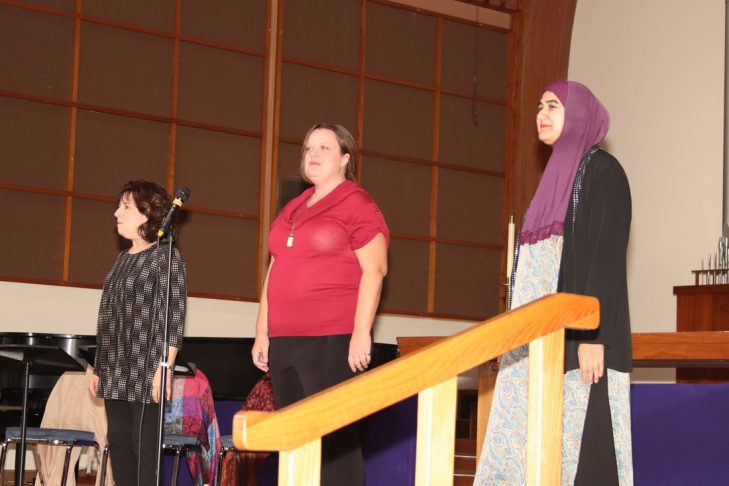Salaam. Shalom. Peace. Arabic. Hebrew. English. These three languages are featured in the stories that Rohina Malik, Susan Stone and Kim Schultz told on the stage of the New Rep Theatre last week. Lucia Thomas brought a fourth language—music—to the performance. Thomas played songs on the violin, oud and guitar that ranged from a rousing interpretation of “Bei Mir Bist Du Schon” to a duet of the Christian hymn “Amazing Grace.”
This was a return appearance to the New Rep for Malik. Last year she brought her one-woman show “Unveiled” to Boston audiences. In that performance, she told the stories of five Muslim women based in London, Chicago and Karachi. The women served tea in their respective living rooms as they lifted their metaphoric veils to uncover their hopes and dreams and fears. Malik wrote “Unveiled” in 2008 in response to the tragic events of 9/11. Her aim was to break down stereotypes of Muslims as terrorists. “Please, Allah, let it be a mistake,” pleads Layla, a character, who is awaiting word on the fate of her brother, a firefighter who rushed into one of the towers.
Layla was featured again in one of the three stories that Malik told in “Keeping Faith: Sisters of Story.” Schultz, a Christian writer, actor, storyteller and refugee advocate, and Stone, a Jewish storyteller, told their respective three stories of faith and culture. The play, an interfaith collaboration by the three women, was conceived and written after the 2016 presidential election.
Malik told another story that connected Islam to Christianity and Judaism. In it, Mary gives birth to Jesus alone and finds the strength to shake a date tree to ease her hunger. Hagar discovers a well, as she and her son, Ishmael, are about to die of dehydration in the desert. The two biblical women received a miracle from God, but not until they put forward efforts to save themselves. For Malik, the women acquire a herculean strength that inevitably manifests in a mother saving her children. It was something that Malik learned firsthand when her young daughter was diagnosed with epilepsy, and Malik experienced her own miracle.
Stone told an affecting story about Yussel, a miser and the most unpopular man in the village, that had a surprising twist. She also told an inspirational story about a man who seeks the counsel of a rabbi about his crumbling town and the deteriorating synagogue in the center of it. The rabbi had only this observation to share: “The messiah is amongst you.” The statement initially sent the town into a frenzy over the identity of the would-be messiah. Could it be the man himself who had sought the rabbi’s wisdom? As time went on, the people contemplated their neighbors’ good and bad qualities. Gradually they began to see sparks of the Divine in every person they encountered. They eventually rebuilt their town into a utopian paradise.
Schultz told stories of her time in the Middle East working with Iraqi refugees and participating in an archaeological dig in Jerusalem. She also told a memorable story about the time she sat in front of a man in church who was laughing uncontrollably. On that particular Sunday, she had been trying to will Jesus to show himself to her. Instead, the noisy stranger disrupted her spiritual reverie. At first, she tried to ignore the man’s histrionics, thinking he was homeless, mentally ill or both. After a bit of time had passed, she decided to greet him directly, as was the way in her church. He introduced himself to her as Jesus. Could this actually be Jesus? The encounter highlighted a common frustration for people of all faiths: In this day and age, God does not interact with us directly. The God who argued with Abraham, parted the Red Sea, helped Jesus perform miracles and spoke to Allah has seemingly gone dark. Schultz has a droll sense of humor and decided to roll with the situation for a while. She finally looked him in the eye and shook his hand. It’s an ambiguous but powerful ending.
Each woman brings her personality to her stories, and to the overall show. Malik, who is soft-spoken, is ethereal and spiritual. Stone is a spirited storyteller, modulating her voice and moving her body to song and prayer. Schultz is a straight-talking narrator and a talented actor. Her stories take on issues of consequence for the Middle East and for people of faith.
Salaam, shalom, peace. The women end their performance singing and harmonizing those words. Those are the bywords on their journeys to faith and peace.



